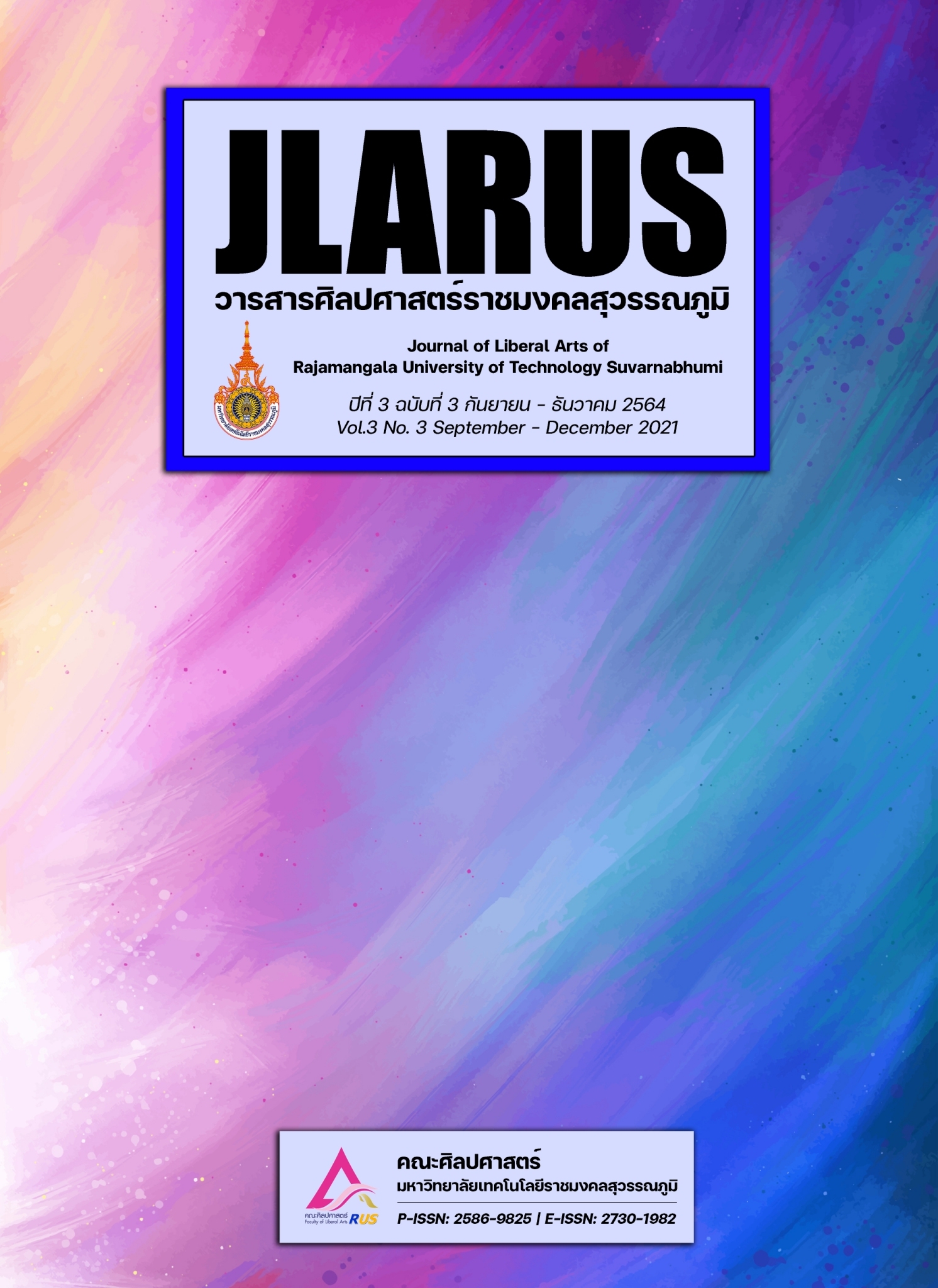THE DEVELOPMENT OF A DIGITAL PLATFORMS FOR BUSINESS ECONOMIC COURSES USING A PROBLEM-BASED LEARNING MANAGEMENT MODEL FOR VOCATIONAL LEARNERS
Main Article Content
Abstract
Abstract
The objectives of this research were: 1) to develop a problem-based learning management model on a digital platform for the courses of Business Economics, 2) to determine the efficiency and effective value by use of the 80/80 standard criteria, and 3) to test the satisfaction and assess the learners’ achievements in learning with digital platforms. The sample studied comprised 30 higher vocational students. The research instruments included: 1) a quality assessment form for the experts and 2) the satisfaction test by the learners. The collected data were analyzed through a statistical software program that provided percentage, mean, standard deviation and t-test values.
The research results were as follows: the digital platform developed has an efficiency of 81.22/82.15 and is consistent with the 80/80 standard criteria by having the effective value of 0.8575 or 85.75%. The evaluation of the digital platform by the experts was 4.05, and they agreed that good LMS lessons should be interesting enough to capture the attention of the users. The satisfaction rate of the students was at high level of 4.18. The research results illustrated that the digital platform on the topic of Business Economics using a problem-based learning management model was highly effective and suitable for higher vocational students.
Article Details
References
ปรัชญนันท์ นิลสุข. (2555). เทคโนโลยีสารสนเทศทางการศึกษา. กรุงเทพมหานคร: ศูนย์ผลิตตำราเรียนมหาวิทยาลัยเทคโนโลยีพระจอมเกล้าพระนครเหนือ.
ปรีชา ศรีซองเชศ, สุริยะ วชิรวงศ์ไพศาล, ดรุณี ปัญจรัตนากร และพงษ์ศักดิ์ ผกามาศ. (2563). การพัฒนารูปแบบการจัดการเรียนการสอนวิชาภาษาไทยโดยใช้เทคนิคการจัดการเรียนรู้ร่วมกันสำหรับนักเรียนระดับชั้นประถมศึกษาปีที่ 6. ในการประชุมวิชาการระดับชาติ ครั้งที่ 4 17 ธันวาคม พ.ศ. 2563, นวัตกรรมเพื่อการเรียนรู้ และสิ่งประดิษฐ์ ประจำปี 2563. ปทุมธานี: มหาวิทยาลัยเทคโนโลยีราชมงคลธัญบุรี.
พงษ์ศักดิ์ ผกามาศ และปรางทิพย์ เสยกระโทก. (2556). การพัฒนาหนังสืออิเล็กทรอนิกส์แบบมีปฏิสัมพันธ์รายวิชาระบบไอซีทีและการจัดการยุคใหม่. วารสารสารสนเทศศาสตร์ มหาวิทยาลัยขอนแก่น. 31(1), 25-43.
สุริยะ วชิรวงศ์ไพศาล, ดรุณี ปัญจรัตนากร และพงษ์ศักดิ์ ผกามาศ. (2563). การพัฒนาระบบบริหารจัดการเรียนรู้เพื่อสนับสนุนการศึกษาทางเลือกสำหรับการศึกษาขั้นพื้นฐานระดับมัธยมศึกษา. ในการประชุม สคบศ. วิชาการ ครั้งที่ 1, 3 สิงหาคม 2563. 55-56. กรุงเทพมหานคร: สถาบันพัฒนาครู คณาจารย์ และบุคลากรทางการศึกษา.
ญาณินท์ อุดมสุขถาวร. (2562). การพัฒนารูปแบบการจัดการเรียนรู้เพื่อพัฒนาความคิดสร้างสรรค์กลุ่มสาระสาระการเรียนรู้ศิลปะ โดยประยุกต์ใช้ทฤษฏีคอนสตรัคติวิสต์ร่วมกับสื่อ Augmented Reality สําหรับนักเรียนชั้นมัธยมศึกษาปที่ 3 (วิทยานิพนธ์การศึกษามหาบัณฑิต). ชลบุรี: มหาวิทยาลัยบูรพา.
อดุลย์ ไชยเสนา, ดรุณี ปัญจรัตนากร และพงษ์ศักดิ์ ผกามาศ. (2563). การพัฒนาสื่อการสอนรายวิชาวิทยาการคำนวณโดยใช้หลักการคิดเชิงวิเคราะห์ผ่านระบบบริหารจัดการเรียนรู้สำหรับนักเรียนระดับประถมศึกษา. การประชุม สคบศ. วิชาการ ครั้งที่ 1, 3 สิงหาคม 2563. 87-88. กรุงเทพมหานคร: สถาบันพัฒนาครู คณาจารย์ และบุคลากรทางการศึกษา.
Carlucci, D., Renna, P., Izzo, C., & Schiuma, G. (2019). Assessing Teaching Performance in Higher Education: a Framework for Continuous Improvement. Management Decision. 57(2), 461-479.
Cournoyer, L.F., Geneviève, J., (2017). Going back-to-school in Vocational Education and Training: Introduction. International Journal for Research in Vocational Education and Training (IJRVET). European Educational Research Association. 4(3), 196-205.
Deng, L., & Ma, W. (2018). New Media for Educational Change. 3-11. New York: Springer.
Fumasoli, T., Barbato, G., & Turri, M. (2020). The determinants of University Strategic Positioning: a Reappraisal of the Organisation. Higher Education. 80, 305–334.
Huijser, H., Kek, M.Y.C.A., & Terwijn, R. (2015). Enhancing Inquiry-Based Learning Environments with the Power of Problem-Based Learning to Teach 21st Century Learning and Skills. Emerald Group Publishing Limited, October 2015, 301-320.
O'Brien, E., McCarthy, J., Hamburg, I., & Delaney, Y. (2019). Problem-Based Learning in the Irish SME Workplace. Journal of Workplace Learning. 31(6), 391-407.
Okolie, U.C., Elom, E.N., Igwe, P.A., Binuomote, M.O., Nwajiuba, C.A., & Igu, N.C.N. (2021). Improving graduate outcomes : Implementation of problem-based learning in TVET systems of Nigerian higher education. Higher Education, Skills and Work-Based Learning. 11(1), 92-110.
Silva, A.B.D., Bispo, A.C.K.d.A., Rodriguez, D.G., & Vasquez, F.I.F. (2018). Problem-Based Learning: A Proposal for Structuring PBL and its Implications for Learning Among Students in an Undergraduate Management Degree Program. Revista de Gestão. 25(2), 160-177.
Yunus, M.M. (2018). Innovation in Education and Language Learning in 21st Century. Journal of Sustainable Development Education and Research. 2(1), 33-34.


